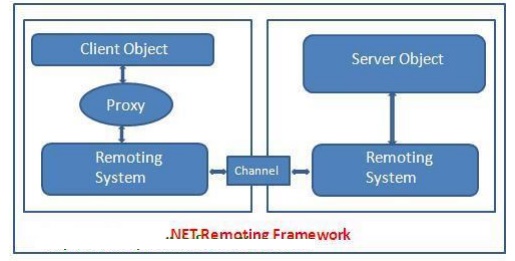Chapter: C# and .NET Framework
.NET Remoting
Remoting
The .NET Remoting provides an inter-process
communication between Application Domains by using Remoting Framework. The
applications can be located on the same computer , different computers on the
same network, or on computers across separate networks. The .NET Remoting
supports distributed object communications over the TCP and HTTP channels by
using Binary or SOAP formatters of
the data stream.
The main
three components of a Remoting Framework are :
1. C#
Remotable Object
2. C# Remote
Listener Application - (listening requests for Remote Object)
3. C# Remote
Client Application - (makes requests for Remote Object)
The
Remote Object is implemented in a class that derives from System.MarshalByRefObject
.

You can
see the basic workflow of .Net Remoting from the above figure. When a
client calls the Remote method, actually the client does not call the methods
directly . It receives a proxy to the remote object and is used to invoke the
method on the Remote Object . Once
the proxy receives the method call from the Client , it encodes the message
using appropriate formatter ( Binary
Formatter or SOAP Formatter ) according to the Configuration file. After that
it sends the call to the Server by
using selected Channel ( TcpChannel
or HttpChannel ). The Server side
channel receives the request from the proxy and forwards it to the Server on
Remoting system, which locates and invokes the methods on the Remote Object.
When the execution of remote method is complete, any results from the call are
returned back to the client in the same way.
Before an
object instance of a Remotable type can be accessed, it must be created and
initialized by a process known as Activation. Activation is categorized in two models , they are Client-activated
Objects and Server-activated Objects.
C# Remote
Activation
The real
difference between client-activated and server-activated objects is that a
server-activated object is not really created when a client instantiates it.
Instead, it is created as needed. By default the .NET Framework ships with two
formatters(Binary Formatter or SOAP Formatter ) and two channels(TcpChannel
,HttpChannel).
C# Remote
Channels
C# Remote
Formatters
Formatters
and Channel are configured by using Configuration files. It can be easily
Configured by using XML-based files.
C# Remote
Configuration
Related Topics